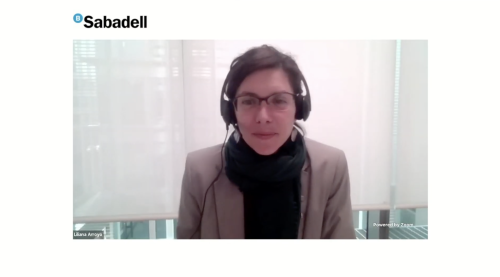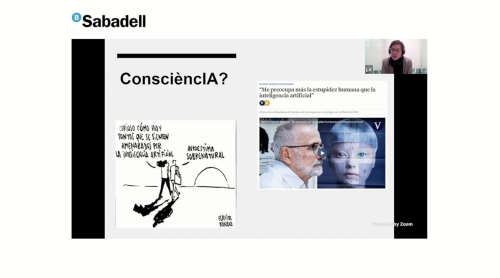The Chief Executive of Digital Society of the Government of Catalonia, Liliana Arroyo, visited Sabadell Forum to close the last meeting of the Trustworthy AI season for this year. In a live streaming event, she talked about the impact that artificial intelligence is having on society, how it is being integrated in people's reality and the facilitating role of the public administration to reduce and eliminate the digital divide.

The impact of artificial intelligence (AI) is generating an endless flow of headlines in the media, which contributes to creating a medley of conflicting sensations among the general public: magic, superpowers, threats, mayhem or opportunities. The chief Executive of Digital Society recalled that throughout human history there have always been divisive reactions to a process of technological innovation. One need go no further, as a newspaper article from the 1970s showed, than the appearance of the pocket calculator which resulted in groups of mathematics teachers taking to the streets to protest at the way students were using them and how this could impact on the teaching of the subject. Although it’s just an anecdote, the mobilisation of those teachers was the result of a popular imagination that the passing of time has shown it did not have the dramatic outcome that they predicted.
And the fact is that rather than fearing technology, machines or artificial intelligence in this case, we need to pay more attention to the actions of the people who are behind these digital advances. As the pioneer of AI in Spain, Ramón López de Mantarás, says: “I’m more worried about human stupidity than artificial intelligence". It's a sentiment that Liliana Arroyo shares and that in some way tie in with the mission of the organisation she heads, Digital Society: to facilitate the transition to a mature, inclusive and fair digital society. To achieve it, she stressed that it is important to have “a critical, skilled and digitally empowered citizenry".

Liliana Arroyo explained the role that the public authorities must play to avoid a digital divide in vulnerable communities. She discussed regulation and people’s self-confidence. In her opinion, we must aspire for any citizen to use technology autonomously and the way to achieve this is for them to gain critical mass and empowerment. The Chief Executive of Digital Society also explained how the Government of Catalonia is introducing AI into people's daily lives to achieve widespread well-being. Thanks to its implementation, the detection of traffic infringements is being improved, a chatbot has been created so that any member of the public can easily identify the official agency procedure that interests them or a clinical assessment programme for the diagnosis of skin cancer has been launched in the field of health, among other initiatives.
We encourage you to accompany Liliana Arroyo's full talk here.
This was the sixth session of the season Trustworthy AI organised by the Analytics and Artificial Intelligence Directorate this year, which also featured:
Xavier Marcet: “How AI is transforming our lives”
Richard Benjamins: “The use of ethics in artificial intelligence”
Lorenzo Cotino: “Managing privacy”
Idoia Salazar: “Transparency in artificial intelligence algorithms”
Karina Gibert: “Gender diversity in AI: risks and opportunities”